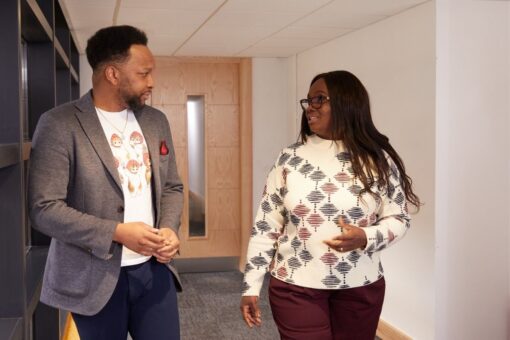Applications are now open to join the programme in summer 2025.
Changing narratives: True advocacy requires empathy

Adam Spencer is soon to be moving into his second year on Approach Social Work (formerly known as the Frontline programme) as part of the 2022 cohort.
Adam’s enthusiasm for advocacy and anti-oppressive practice is infectious. Whilst at the beginning of his journey as a social worker, he demonstrates a deep understanding and capacity to help make positive changes in children and families’ lives.
It made me think that maybe I can make a real difference for families.
My view of social work was a historically negative one of being overworked and underpaid. I never considered social work as a career path before because I always saw social workers as agents of the state; there to safeguard children, but unfortunately bound by very oppressive practices. But after graduating last year, I looked more into Frontline and Approach Social Work, and what pulled me in was the commitment to anti-oppressive, anti-discriminatory practice – it made me think that maybe I can make a real difference for families.
I really enjoyed and appreciated having anti-oppressive, anti-discriminatory practice as an underpinning for the therapeutic principles and techniques taught on Approach Social Work, which come back to having compassion and empathy for people. Social work can be very crisis management orientated and I think Frontline gives you the skills, through anti-discriminatory and therapeutic techniques, to become a more reflective and proactive practitioner. That means focusing on putting support in place for a family who need a social worker because you understand that it will benefit the family in the long term. It can also counteract what can sometimes be a reactive and oppressive practice particularly because when you are having to work under constraints. A growing awareness of the injustices across the world and within the UK is having a huge impact on social work.
Part of empathy is giving someone the space to feel and not trying to equate it with your experiences or how you feel; I think that’s a vital thing I see social work embracing more.
Something I’m happy to see from starting my placement in September last year is that we do a lot more work around the identity of the child and the family, not just in terms of race and background, but sexuality, gender and class as well. Considering the intersectionality of someone’s identity means that you can understand that this person may look and have had some similar experiences to you, but you don’t fully know what life is like in their shoes. Part of empathy is giving someone the space to feel and not trying to equate it with your experiences or how you feel; I think that’s a vital thing I see social work embracing more.
I would say now that social work is the best job I’ve ever had in terms of being able to help people. It’s showed me that you can make such a difference in people’s lives.
I come from a law background, so advocating for people facing social injustice was always something that I wanted to do. When you’re met with certain issues in practice, such as people lacking curiosity about families or even systemic issues like poverty, Frontline gives the knowledge base to identify these issues and then tackle them. It’s important to advocate for families and change the narrative around them because that narrative can be so beneficial or so detrimental. Unless we as social workers step in and mould the narrative in a positive direction, we’re not really doing our jobs. I would say now that social work is the best job I’ve ever had in terms of being able to help people. It’s showed me that you can make such a difference in people’s lives.